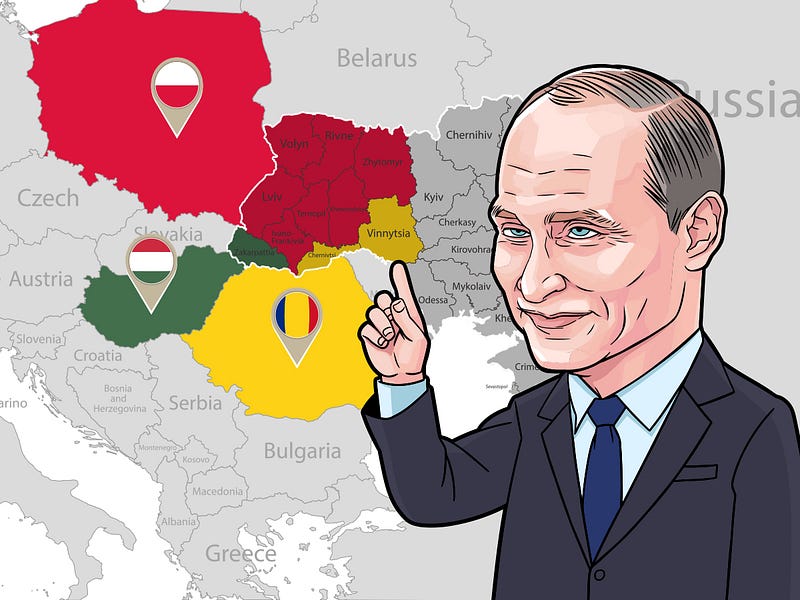
In his speech on the National Unity Day on November 4, Russian President Vladimir Putin talked of Ukraine’s supposed territorial disputes with Poland, Romania and Hungary, accusing the mentioned European countries of seeking ’to return the territories of Ukraine that were taken from them by Stalin after the World War II.’
Following Putin’s provocative words, all the three concerned states hurried to express in different ways that the Russian president only wanted to escalate the tense situation around Ukraine, and no one should have taken his words seriously. However, it is worth paying attention to the small differences between the three reactions.
’The Ministry of Foreign Affairs of Romania rejects the assertions expressed by the President of the Russian Federation (…), which falsely induced the idea that Romania has territorial claims against Ukraine,’ the Romanian diplomacy said in its post.
In addition to denying any territorial claims to Ukraine, there was one more statement on behalf of Poland, namely, that ’Putin spreads disinformation’.
’We do not consider statements that deepen the war conflict to be correct. Instead of such declarations, an immediate ceasefire and peace negotiations are needed!’, the Hungarian MFA commented on Putin’s words regarding Budapest’s territorial claims to Ukraine. It should be noted that a few days later the speaker of the Hungarian Parliament in a speech said that ’Transcarpathia is a European issue which requires a European solution.
Three countries, three interests, three different views. As for myself, I believe that the content of the second part of the Polish reaction is closest to the truth — all other comments are nothing more but ordinary political statements.
First of all, I would like to emphasize that, in my opinion, it is very strange to demand politicians and foreign ministries declare what they do NOT want. In addition, as far as I know, politicians never say what they really think or intend to do. Politicians have clear political goals, and they calculate everything when they choose the most appropriate narrative to achieve these goals. I suggest adopting the same approach to interpreting both Putin’s provocative words and the reactions of the three European countries.
In other words, both the statements of the Russian presidents and the reactions of the addressed European countries DO NOT mean anything, in the literal sense of the word. What matters is WHY Putin said this and what he wanted to achieve. And here comes the Polish view, stating that Putin spreads disinformation: this is what matters! Russia is aware that Warsaw is the strongest supporter of Kyiv in Eastern Europe that is why Moscow is trying to divide the two good brothers, Poland and Ukraine, which may negatively affect their close ties with the U.S. as well. Romania and Hungary are only episodic players in this game. Their only function is that their involvement can reinforce the historical well-foundedness of the main anti-Polish narratives.
But Polish politicians have an excellent knowledge on the Russian way of thinking. This experiment helped them to react the best way, saying that Putin’s statement was nothing else but spreading of disinformation. I can back up this argumentation with some other facts. To prepare Putin’s words during the National Unity Day’s speech, some Kremlin-controlled Russian media outlets rehashed the claim that Poland plans to annex Western Ukraine already in October. At that time, Romania and Hungary, for obvious reasons, were not yet mentioned at all. As minor characters, they entered the stage on November 4, when Putin debuted with his well-planned statement about the territorial claims of three states to Ukraine.
Among world political leaders, Putin has always been showing an outstanding ability to mislead his partners and he also starred in spreading disinformation. With his statement on territorial claims of certain countries to Ukraine, he seems to be returning to his original profession: weaving of intrigues and confusing international affairs à la Russian Intelligence Service.
At this point, let me make one additional remark: in the course of confusing the adversary, and influencing various political decisions, the opinion of the most influential political actors, etc., as a general rule, there is at least one true element in the narrative which is taken as a basis for a further made-up story. In this case, the territorial losses of Poland, Romania and Hungary in favor of Ukraine (USSR) after WW2 and the hopeless sadness in certain communities of these countries are the true pieces of information.
The power of the truth should never be under-estimated. This phrase is even more appropriate when it comes to acts of historical justice. Putin is fully aware of the power of words. After mixing up different eras and different interests, he only needs to be comfortably settled in his arm-chair, and wait for a favorable result.
Leave a Reply